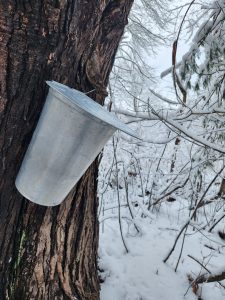4-H Maple Sugaring 101
From Sap, to Syrup, to Sales
A six-week program open to Maine youth ages 9 and up
 Not long after the New Year celebrations have ended and Maine hunkers down for several more weeks of winter, some farmers and landowners across the state turn their attention to maple sugar season. Depending on the weather, maple trees start to release their sweetness anytime between February and April and there’s a lot of work to be done to prepare for collecting the sap and boiling it down into syrup.
Not long after the New Year celebrations have ended and Maine hunkers down for several more weeks of winter, some farmers and landowners across the state turn their attention to maple sugar season. Depending on the weather, maple trees start to release their sweetness anytime between February and April and there’s a lot of work to be done to prepare for collecting the sap and boiling it down into syrup.
Maple Sugaring 101 is a 6-week program open to Maine youth ages 9 and up who are interested in learning about the maple sugaring process from start to finish. Participants will learn about tree identification, tapping trees, sap collection, using an evaporator, grading and canning syrup, and operating a maple sugaring business.
Each week, participants will learn about the process and connect with other young maple sugarmakers through online meetings and in-person workshops led by Extension and University of Maine experts. Online meetings are scheduled for Wednesday evenings, 5:30–6:30 p.m.: February 7, February 14, and February 28. On-site workshops will be held at participating sugarhouses on Saturdays. Youth will need to travel to participating sugarhouses.
Who: Youth ages 9 and older
Where: University of Maine Cooperative Extension will host the weekday meetings via Zoom; Onsite sessions will be located located at a partnering sugarhouse.
What: During this 6-week program, participants will learn about the entire process, from forest management, tapping trees, transporting sap, using an evaporator, grading and storing syrup, to operating a maple sugaring business.
Why: To have fun while experiencing the essential aspects of the maple sugaring process and meet other young maple sugar makers across the state.
On-site:
Dates of sugar house visits will vary by county, but will vary by sugar house locations. Date ranges for sugar houses in central and southern Maine may fall within:
- First session: Mid to late February
- Second session: Early to mid-March
- Third session: Mid to late March
We appreciate the support of our sugar house partners:
- The Maple Moose, Easton, Maine
- Bradbury Maple Farms, Bridgewater, Maine
- Duck Grove Farm, Dover-Foxcroft, Maine
Online, 5:30–6:30 p.m. on the following Wednesdays:
- February 7, 2024
- February 14, 2024
- February 28, 2024
Registration is required, but there is no cost.
Enrollment in 4-H is required, but there is no cost. Enrollment ends February 5, 2024.
For more information or to register, contact your county office or Andrew Hudacs, andrew.hudacs@maine.edu, 207.581.8204:
- Aroostook County: Megan Cook, megan.cook@maine.edu, 207-532-6548.
- Penobscot or Piscataquis County: Sheila Norman, sheila.norman@maine.edu; 207.942.7396 or 207.564.3301.
- Somerset County: Karen Giles, karen.giles@maine.edu; 207.474.9622.
Instructional Content Guide:
General questions about the program can be directed to Andrew Hudacs, andrew.hudacs@maine.edu; 207.581.8204.
For more information or a reasonable accommodation, please contact the person listed at one of the local county offices listed above.
4-H is a community for all kids with programs that suit a variety of backgrounds, interests, budgets and schedules. In 4-H programs, kids and teens complete hands-on projects in areas like health, science, agriculture and civic engagement in a positive environment where they receive guidance from adult mentors and are encouraged to take on proactive leadership roles. Clubs can take a variety of forms, ranging from at home, in school, after school, in person and online. As a system, Cooperative Extension believes that diverse perspectives, values and beliefs help generate better ideas to solve the complex problems of a changing—and increasingly diverse—world.
In complying with the letter and spirit of applicable laws and pursuing its own goals of diversity, the University of Maine System does not discriminate on the grounds of race, color, religion, sex, sexual orientation, transgender status, gender, gender identity or expression, ethnicity, national origin, citizenship status, familial status, ancestry, age, disability physical or mental, genetic information, or veterans or military status in employment, education, and all other programs and activities. The University provides reasonable accommodations to qualified individuals with disabilities upon request. The following person has been designated to handle inquiries regarding non-discrimination policies: Director of Equal Opportunity, 5713 Chadbourne Hall, Room 412, University of Maine, Orono, ME 04469-5713, 207.581.1226, TTY 711 (Maine Relay System).
